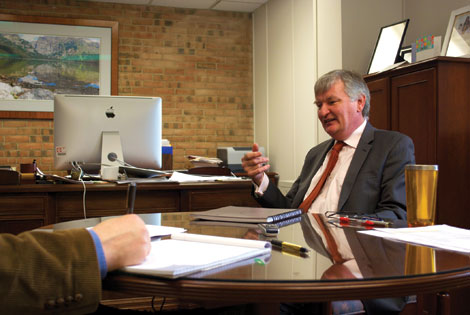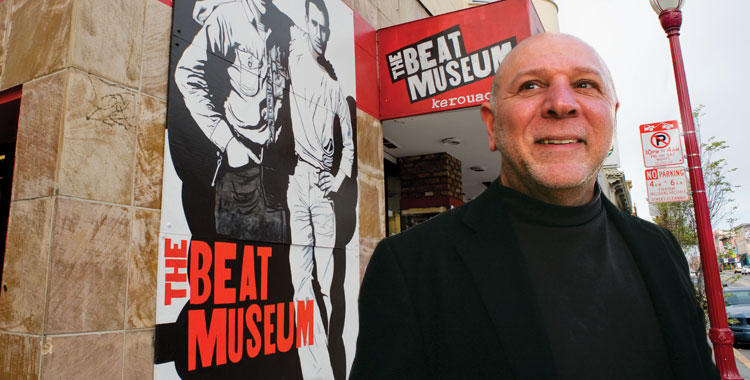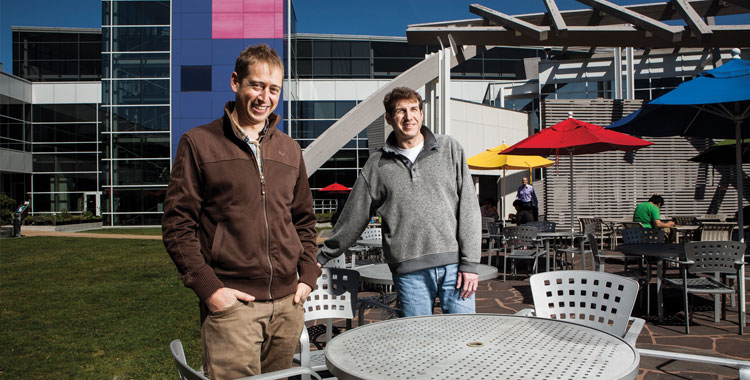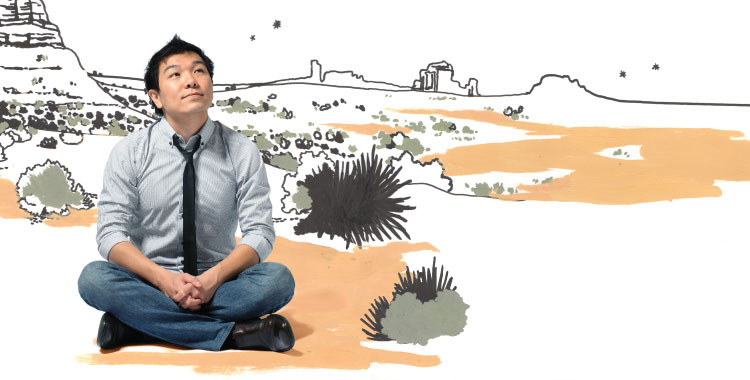On July 1, Philip Rous will become provost at UMBC after serving for a year as the interim provost. In his 22 years at the university, Rous has filled key leadership positions – including president of UMBC’s faculty senate and dean of the College of Natural and Mathematical Sciences (CNMS). UMBC Magazine spoke with him about his view of the university.
Q. UMBC is known for its exceptional undergraduate education experience. How has the university earned that reputation?
A. The importance attached to undergraduate education has been here ever since the founding of the university. Those who came to teach here at UMBC did not just come to be professors or to do research but to found a new university.
Many of those characteristics present at the university’s founding have remained through the years. If you look at photographs of the campus back in the 1960s and 1970s, what you notice is that when you see students, you also see faculty with them. In the classroom. In the lab. Faculty and students working together. That was very much a characteristic of the people who came here. They wanted to be closely involved with students.
That tradition and objective of a high-quality undergraduate education in a public setting – and access to it – has remained through the years. And we’ve continued to recruit faculty and staff who are similarly committed to that objective. It is a fundamental value of UMBC.
Another value here at UMBC is that we’ve always been innovative and entrepreneurial – and we always want to do better. So if you look at developments here broadly, in research and education, over the years, it’s really a story of staff and faculty working together and with students to develop new approaches to teaching, learning and scholarship with the fundamental objectives being to support student success and to be at the forefront of the discovery of new knowledge.
What specific changes in undergraduate education have occurred over the past 22 years that you have been at UMBC?
The way I look at it is that we’ve gone from a view of the educational endeavor as teaching to a view of education as learning.
There has been a gradual move away from the standard “sage on a stage” type of teaching to a more student-centered learning approach. Most recently this has been happening a great deal in the sciences, but it’s important to remember that when you look at many courses in the arts, humanities and social sciences, this type of focus on active student engagement was already there.
But the big lecture theatre format – with 300 students in the class – that was typical of a physics class when I arrived here is changing. That doesn’t mean we’ve eliminated all the lectures or that the lecture format cannot be effective. But now we have we have developed other new and interesting ways to support student learning that are now a vital part of how we approach our educational mission.
What I saw when I came here, for instance, was the development of tutorial centers on campus. The development of the Learning Resources Center (LRC) to support students, for instance. And then, as you move to the late 1990s, there was a movement toward making our lecture classes more interactive so that we could get students more engaged. So you had the introduction of “clickers” on campus as a way of being able to interact with students in the lecture theatre classroom. And we actually still use them today.
So what I saw when I looked out across campus was that faculty in all of the colleges were trying to innovate within their current facilities and classrooms to improve student learning. The clickers are a good example. Or the creation of discussion sections, which evolved into students solving problems with the support of the teaching assistants and the faculty. That was the foundation of everything. The faculty was invested in the success of their students.
And what’s happened more recently is that we’ve been able to take that to the next level.
First, we asked what do we need to take it to the next level. In the College of Natural and Mathematical Sciences (CNMS), we have the Chemistry Discovery Center, which is actually a special environment designed to help faculty facilitate what they are trying to accomplish.
These activities are very much in line with what I was hearing from the faculty: Can we think about the classroom environment now? How does that support student learning? Can we leverage technology in that area? And what about our writing courses and digital humanities? The outstanding efforts to redesign introductory psychology and the new state-of-the art writing labs in the new Performing Arts and Humanities Building are just two examples. We’re also talking about design and engineering – including spaces like the CNMS Active Science Teaching and Learning Environment (CASTLE) and the Chemistry Discovery Center.
So we’re taking a more deliberate institutional approach to student success. The environment – such as classrooms – is an important part of that. But the effort that it takes to design state-of-the-art facilities like the new writing labs in the new Performing Arts and Humanities Building, environment is nothing without faculty who are able to do all the hard work to understand the research in the field of teaching and learning, revise their curriculum to reflect how students learn, and then carefully assess what they’re doing.
That’s why we’re starting the Hrabowski Fund for Innovation – a new fund for innovation in teaching and learning at UMBC. There will be a competition across campus to actually propose and try out new ideas – and then to assess them to see if they work.
UMBC has increased its research footprint as well. How does that match up with teaching undergraduates?
Often people look at education and research as two separate activities – and it’s even somewhat reflected that way in UMBC’s mission statement.
But in my view, these are both very highly integrated in the research university like UMBC. Research is, essentially, discovery. It means creating new knowledge. But the creation of knowledge and education are very closely tied together and that is why we want our faculty to be at the frontier of their discipline. People who work at the frontier of their field are the best able to educate our undergraduate and graduate students. And faculty engaged in research or scholarship or creative activity can also work with our students so that they can engage in the process of discovery and understand the intellectual foundation of their own curiosity.
There’s also the fact that research is the discovery of new knowledge. And that’s a fundamental aspect of what it means to be human. If you could pick some things that are fundamental to our own humanity, curiosity would certainly be one of them. We are compelled to understand our own humanity and the natural world around us. From my perspective, great universities are a fundamental expression of human curiosity and the preservation and nurturing of that ideal.
Part of the growth of UMBC as a research institution can measured in numbers: The university is flirting with a total of $100 million in external research funding per annum – and is now awarding 100 Ph.D.s each year. Where are we headed next as a research university?
My view of where we are going as a modern research university is rooted in the particular context and history of our university. We were founded, primarily, as an undergraduate institution with a liberal arts base but we rapidly developed a very strong reputation for research and graduate education. As we have evolved, we have sometimes looked at large research institutions…. and wondered if that is what we will become. We have also looked at the model of the small liberal arts university, and thought that maybe that’s where we were going.
The important thing is that everything we have done over the past 40 or 50 years has earned us the right to establish for ourselves where we are headed and what we will become. And my personal perspective is that we will become the new model of a public university that continues to pursue excellence and innovation in education and scholarship without either taking anything away from the other.
External funding, for instance, is a measure of excellence in many disciplines. But we have to be a careful not to generalize that observation as far as defining the excellence piece of it, because there are many disciplines where large amounts of external funding are not available or not really appropriate. Yet a person working in those fields can be a world-class scholar in exactly the same way that a scientist or engineer who is bringing in millions of dollars. Indeed, in order to pursue world class research in the STEM fields, you generally need to have external funding, because they are technology-based. And that is expensive.
The difference is in the disciplines, not in the excellence. And excellence is our common goal. We continue to attract world-class scholars to UMBC – and we are going to continue on down that path.
What upcoming initiatives or plans at UMBC excite you the most as you assume the office of provost?
We’re moving to the next stage of the university’s strategic plan that will follow on from UMBC’s Strategic Framework for 2016. We’re four years ahead of that date but we’re already carefully thinking and beginning conversations about the university’s next strategic plan.
Over the next year, we’re also going to talk about what we have learned through our previous planning exercises. Much of what we’ve accomplished has far exceeded the vision laid out in the 2016 framework. Other things we have not done – or we have not managed to do them effectively. Why is that?
My role in these discussions is to facilitate. I am trying to help our community identify and reach goals which the community itself sets. Part of my role is also to make sure that we have a vigorous discussion about these goals and these ideas over the next few years. So that we have a clear vision about how we are going to grow – and a common vision of the university. I am looking forward to that process.
Another part of my job is to think a lot about the values of our university, and how we put those values into action. Not that we aren’t doing that already. But every one of us is busy. We are doing things that are urgent, and that are right in our face, and that have to get done.
As provost, what I have to do is to figure out what’s really important. These are things that may not be done tomorrow or next week but are critical to our university, faculty, staff and students. What sorts of larger things must we be doing to support the success of our students? What must we do to support faculty and staff reaching their professional aspirations? And also how do we develop new leaders at UMBC? We need to make sure that there are individuals who are ready to take on key leadership roles.
Your academic discipline was theoretical physics. Are there qualities that you’ve been able to transfer from that background as you’ve risen in academic leadership?
The transition to academic leadership is different for every single person who steps into such a role. When I came to the university as an assistant professor, my interest was in teaching and research. That was what I was passionate about. And I remember thinking in those days that I never ever wanted to become an administrator.
But the experience that eventually changed my mind was my involvement in departmental and university service and then having the opportunity to serve first as the vice president and then president of UMBC’s Faculty Senate. And when you are vice president or president of the Faculty Senate, you get to see a lot about how the university actually works. And though I might have thought initially that this would not be interesting, I found out that it was very interesting.
For me, the most interesting aspect of these positions was discovering that everyone here on campus is here because they want to make a difference – students, faculty and staff. And somehow I felt that my interest transitioned from making a difference through the research and teaching I was doing to being able to make a difference to our university community. And I also understood that it wasn’t because I – as an individual – would make a difference, but because I somehow sensed that I could work with people and bring people together around things that they were passionate about.
My approach to leadership is not standing on a mountaintop, waving a big flag. It’s to facilitate what our community wants to do and put our shared values into action. To bring people together who have ideas and want to do the work to get it from an idea to something that we can achieve. That is very satisfying.
“What I draw from my physics background is what most people draw from their discipline. It’s analysis. And that’s not just a skill that physicists or mathematicians possess since rigorous analytical skills are required by all disciplines. Nevertheless, navigating the current environment in higher education does require a high degree of analysis a background that gives one the ability to take a look at and ask questions of the data.
That background also lets me ask myself, and other members of the UMBC community, to think about the reasons for what¹s going on and what we see in the data. It¹s also a valuable approach to continuous improvement through assessment. We need to ask if an approach really worked. And, if it did, can we explain it?
In your biography, you mention that during your time as a theoretical physicist, you liked to shift from question to question within the discipline. How does that curiosity play out in your role as an academic leader at UMBC?
The reason I did that, I suppose, was curiosity. The desire to learn new things. The greatest thing about being an academic is that you get to learn for the rest of your life.
I never particularly liked the idea of getting into one narrow field and doing that for the rest of my life, however. I like the idea of taking knowledge and applying it to new situations. And very often science works like this: by taking knowledge and expertise from one field and looking at a question in a different field from that perspective.
The other thing this sort of curiosity does is let you think about working on bigger and more complex problems, rather than simply having one particular expertise. Going out and finding bigger problems that you might be able to approach with your perspective.
For me this is one of the most exciting things about what I do. I’m rather attracted to this kind of work and I hope to use that approach to facilitate and enhance what we do together at UMBC. That is why I feel so honored and privileged to be UMBC’s new Provost.
– Richard Byrne ’86
Tags: Summer 2012




